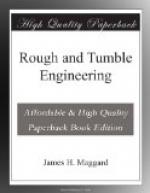Well, we will now go across to the man who is making but little smoke, and making that at regular intervals. We will be likely to find that he has only a little hand shovel. He picks this up, takes up a small amount of coal, opens the fire door and spreads the coal nicely over the grates; does this quickly and shuts the door; for a minute black smoke is thrown out, but only for a minute. Why? Because he only threw in enough to replenish the fire, and not to choke it in the least, and in a minute the heat is great enough to consume all the smoke before it reaches the stack, and as smoke is unconsumed fuel, he gains that much if he can consume it. We will see this engineer standing around for the next few minutes perfectly, at ease. He is not in the least afraid of his steam going down. At the end of three to five minutes, owing to the amount of work he is doing, you will see him pick up his little shovel and throw in a little coal; he does exactly as he did before, and if we stay there for an hour we will not see him pick up a poker. We will look in at his firebox, and we will see what is called a “thin fire,” but every part of the firebox is hot. We will see but a small pile of ashes under the engine and he is not working hard.
If you happen to be thinking of buying an engine, you will say that this last fellow “has a dandy engine.” “That is the kind of an engine I want,” when the facts in the case may be that the first man may have a better engine, but don’t know how to fire it. Now, don’t you see how important it is that you know how to fire an engine? I am aware that some big coal wasters will say, “It is easy to talk about firing with a little hand shovel, but just get out in the field as we do and get some of the kind of fuel we have to burn, and see how you get along.” Well, I am aware that you will have some bad coal. It is much better to handle bad coal in a good way than to handle good coal in a bad way. Learn to handle your fuel in the proper way and you will be a good fireman. Don’t get careless and then blame the coal for what is your own fault. Be careful about this, you might give yourself away. I have seen engineers make a big kick about the fuel and claim that it was no good, when some other fellow would take hold of the engine and have no trouble whatever. Now, this is what I call a clean give away on the kicker.
Don’t allow any one to be a better fireman than yourself. You will see a good fireman do exactly as I have stated. He fires often, always keeps a level fire, never allows the coal to get up to the lower tubes, always puts in coal before the steam begins to drop, keeps the fire door open as little as possible, preventing any cold air from striking the tubes, which will not only check the steam, but is injurious to the boiler.
It is no small matter to know just how to handle your dampers; don’t allow too much of an opening here. You will keep a much more even fire by keeping the damper down, just allowing draught enough to allow free combustion; more than this is a waste of heat.




